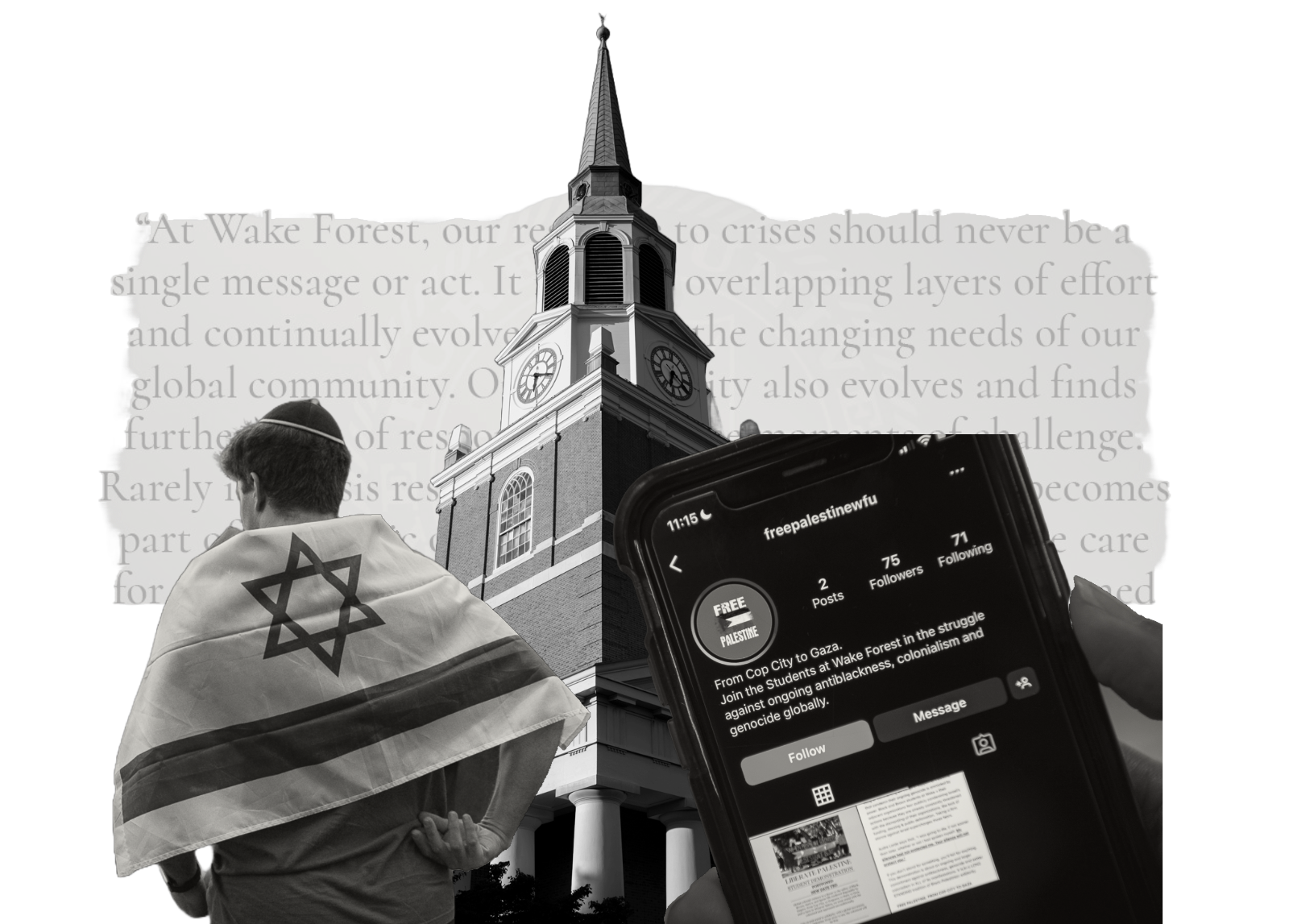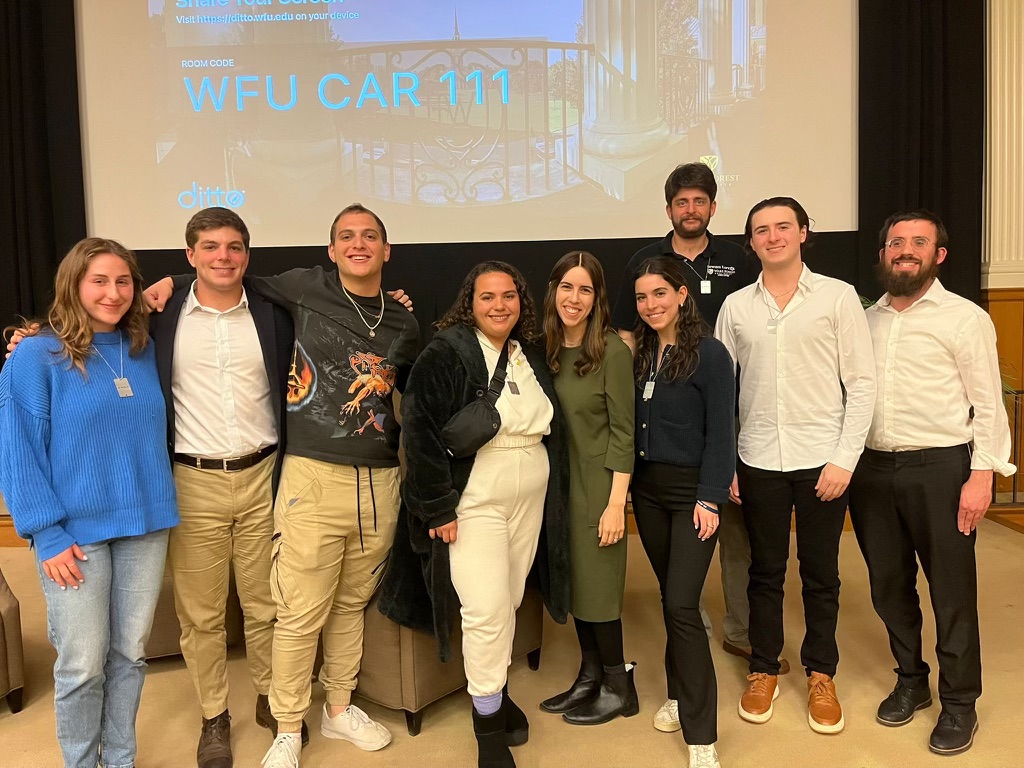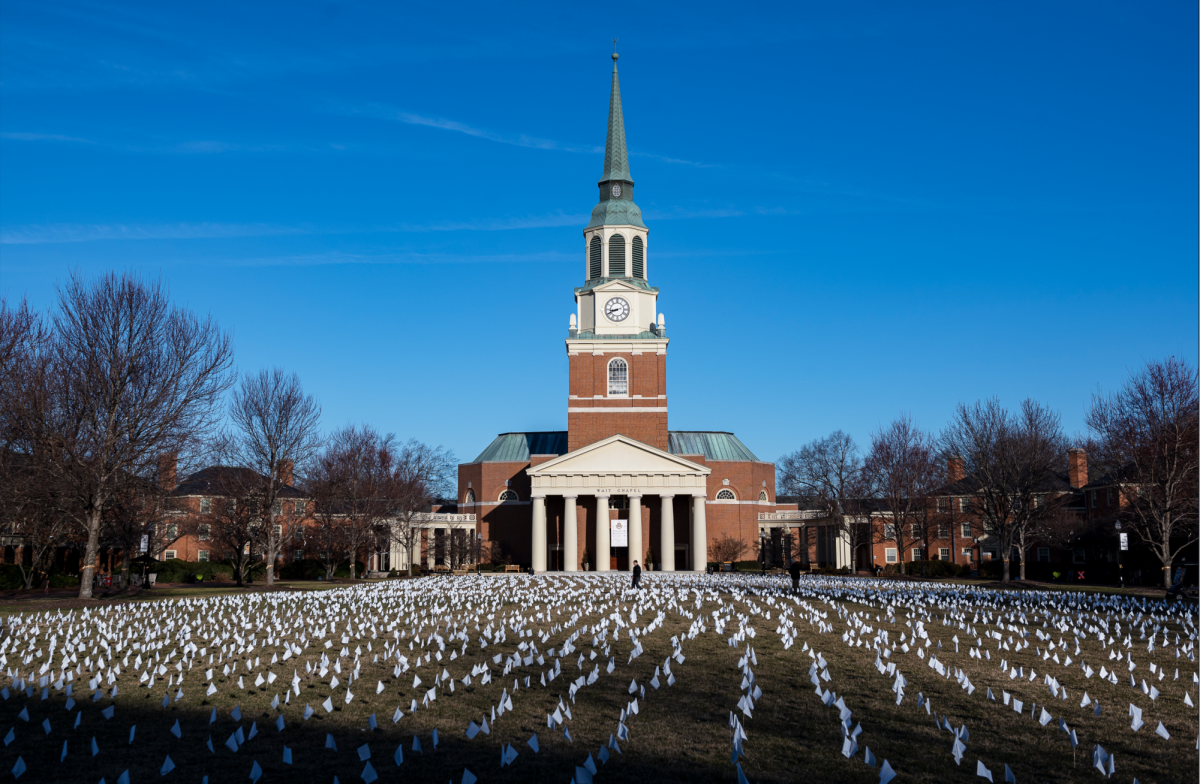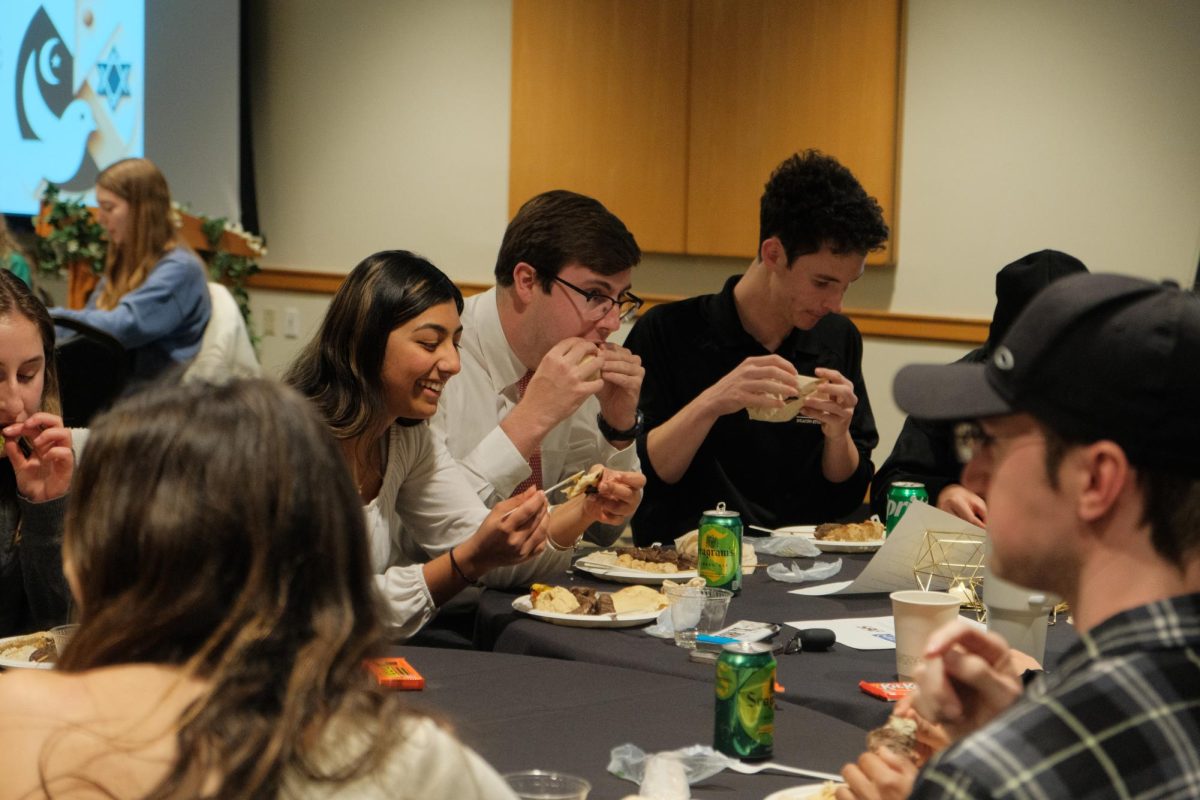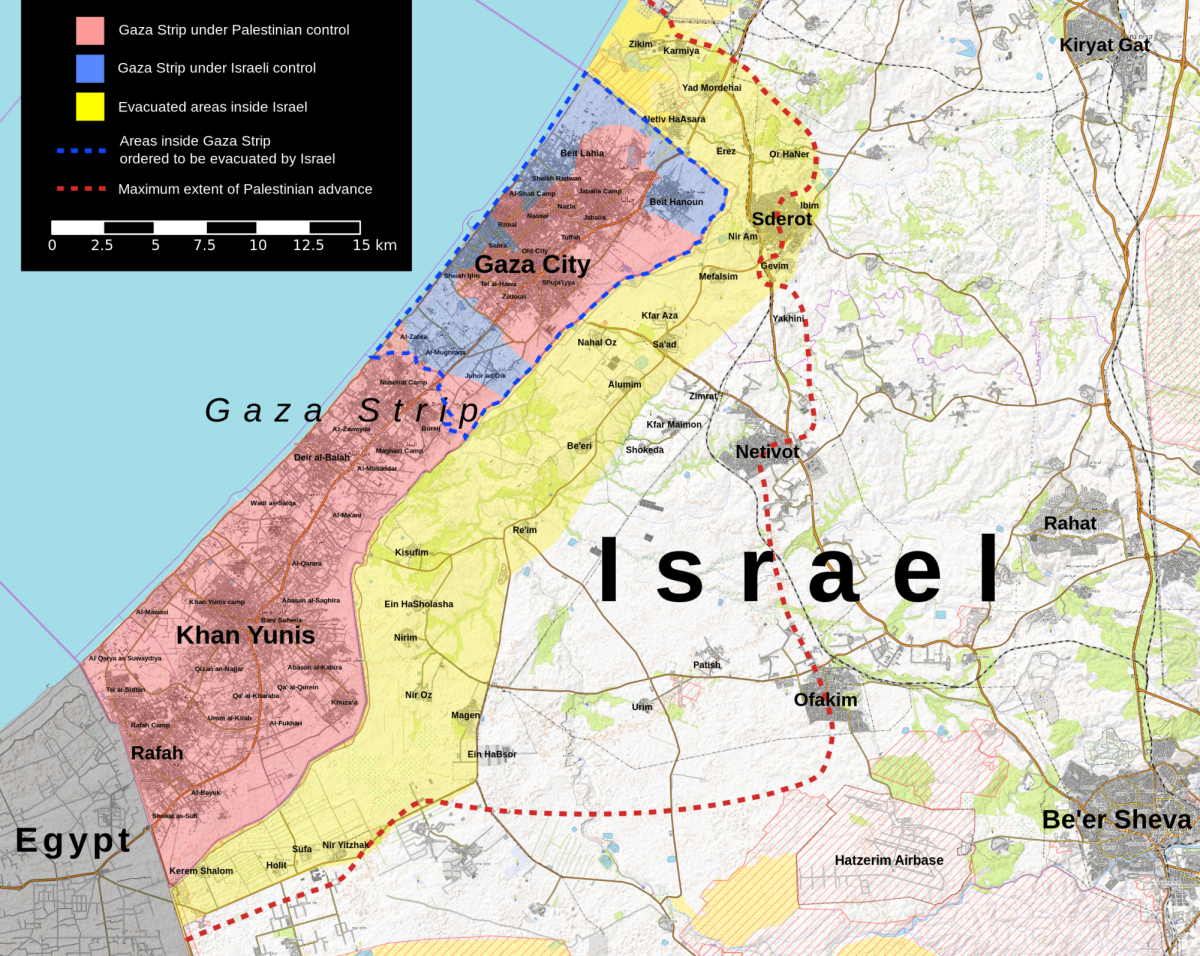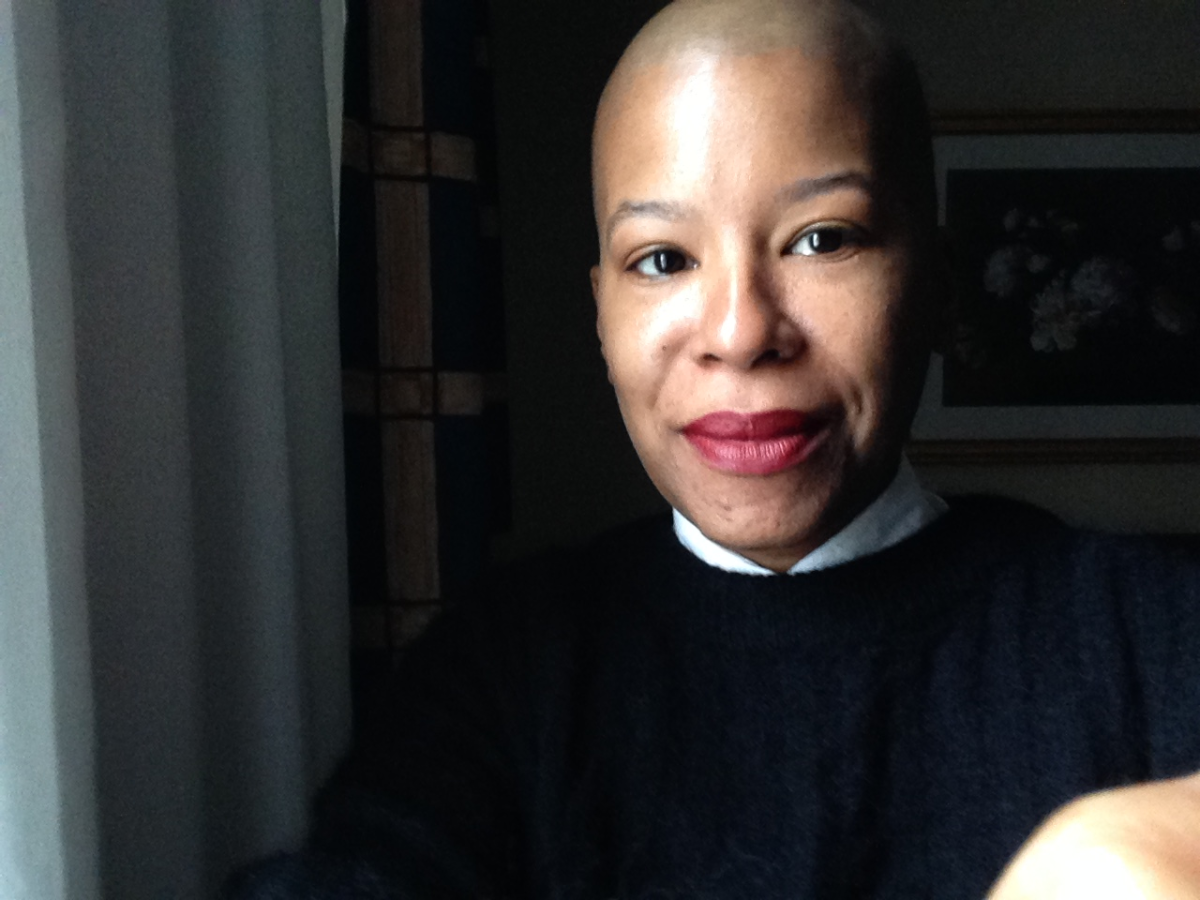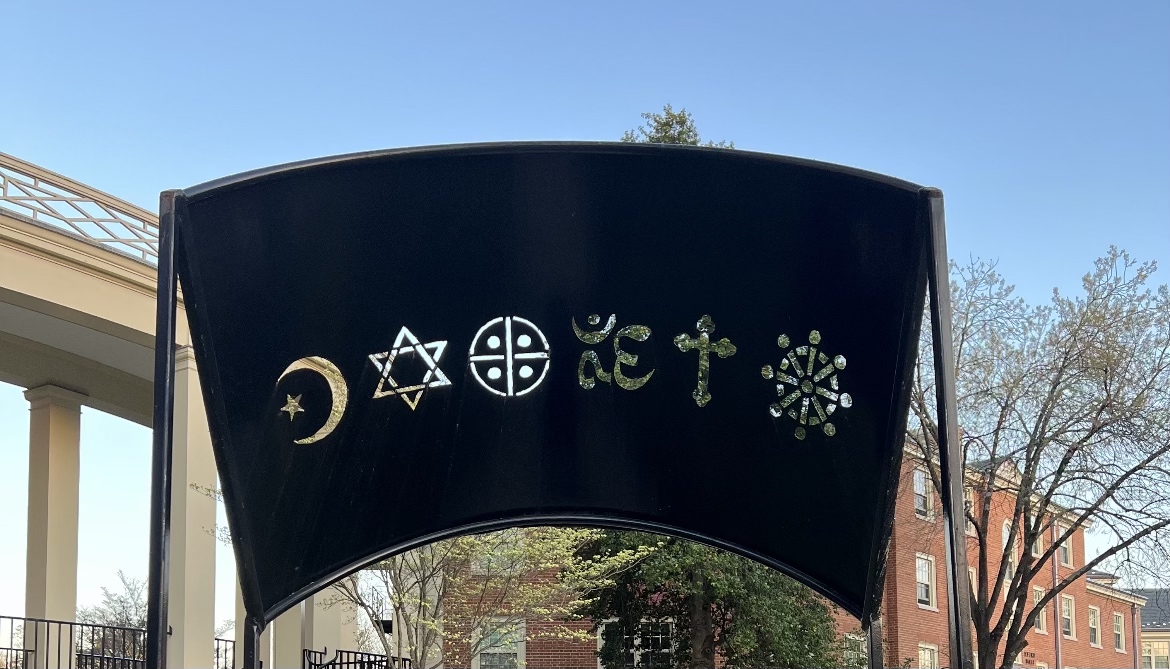The ongoing war in Israel and Gaza hits close to home for Wake Forest students with cultural and familial ties to the region.
Last weekend, the Palestinian militant group Hamas attacked Israeli towns bordering the Gaza Strip — a Palestinian territory that Israel and Egypt have blockaded for the past 16 years. In response to the attacks that left at least 1,400 Israelis dead, Israel has carried out airstrikes and killed more than 2,800 Palestinians, according to the Palestinian Health Ministry.
Thousands of miles away, American college campuses have become flashpoints for protests and advocacy. Administrators at Columbia closed campus to the public due to hundreds of protesters that gathered on campus for pro-Israel and pro-Palestinian demonstrations on Oct. 12. On the same day, UNC Chapel Hill’s Students for Justice in Palestine held a protest that was met with counter-protests from those supporting Israel.
At Wake Forest, Jewish students hosted a candlelight vigil on Oct. 10. An Instagram account called @freepalestinewfu posted about a “Liberate Palestine” student demonstration a few days ago. The demonstration, originally scheduled for Wednesday, Oct. 18, has since been postponed to an unannounced date. The managers of the account did not return the Old Gold & Black’s request by Direct Message for an interview.
As they have read the news and spoken with family and friends, students at Wake Forest have struggled to navigate the violence and political unrest in both Israel and Gaza.
“I’ve spent a lot of hours on my phone refreshing Twitter, seeing what the new news is, how many people have died and what areas are getting affected,” said sophomore Andrey Ismail-Zade after last week’s vigil. “It’s me texting my mom once an hour asking how our family friends are in Israel who are serving on the border and if they’re alive.”
Senior Hasan Pyarali expressed feelings of frustration and hopelessness.
“It just still feels like there’s so little we can do [to help],” Pyarali said. “So that’s kind of where the anger comes from. It is the feeling of being hopeless.”
Four students declined to speak with the Old Gold & Black. One Muslim student cited concerns of being “blacklisted.”
Muslim Life Chaplain Naijla Faizi explained that Muslim students fear the backlash they may receive from speaking out. She said student fears have grown since hearing about students at Harvard being doxxed after writing a statement in favor of Palestinians, saying that Israel was “entirely responsible” for the violence that killed hundreds of people.
“Muslim students feel like they must stay silent and avoid attention or risk being publicly blacklisted or doxxed,” Faizi said.
Hamas’ attack and Israel’s response
On the morning of Oct. 7, Hamas released thousands of rockets into Israel, targeting cities like Tel Aviv. Approximately an hour after the rockets were fired, Hamas fighters crossed into Israel, attacking 22 Israeli towns and army bases. Hamas also took nearly 200 people hostage.
“This is a war and a terror against all Jews across the world,” President of Chabad Chloe Mazo said after last week’s vigil. “And we’re not talking about land right now. That is a fully different issue.”
Pyarali, who is Muslim, said that Hamas’ taking of innocent lives is against his religion.
“Hamas is a horrible group,” Pyarali said. “And their goal is the eradication of Israel and all Israelis, and I think that’s wrong. I unequivocally condemn that and the attack that happened where people at a concert and kids were killed. There’s never a need for that ever, ever, ever.”
According to the New York Times, the leader of Hamas’ military wing Muhammad Deif said in a recorded message that the attacks were in response to Israel’s occupation of the West Bank, Israeli police raids on the Holy Land site Aqsa Mosque and the thousands of Palestinians currently in Israeli jails.
“You know, a lot of times, people said this was unprovoked,” Pyarali said. “I take a little bit of issue with the word ‘unprovoked,’ because there has been an occupation since 1967 of the West Bank. Gaza, since 2007, has been basically an open-air prison.”
He continued: “It often leaves a situation where there’s a lot of hatred. So while I understand that hatred is not an excuse for what they did, there is some context for it. If you lock people up in a cage for so long, there is going to be an explosion. Do I think that was the right way to do it? Absolutely not. But I think that context has to be there and has to be recognized.”
Alongside carrying out airstrikes, Israel responded to Hamas attacks with a “complete” blockade of Gaza — ordering that no food, electricity or fuel be sent to the territory. On Wednesday, Israel said that Egypt will be allowed to deliver “limited quantities of humanitarian aid to the Gaza Strip.” Approximately 360,000 Israeli reservists and troops are stationed at the Israel-Gaza border and Israel has demanded for civilian evacuation of Gaza.
Another student, whom the Old Gold & Black granted anonymity due to their concerns about personal safety, shared that many people choose sides without considering all perspectives.
“Everyone has access to see the injustices that are happening to the people of Gaza,” the student told the Old Gold & Black via email. “Civilians were instructed to evacuate to the southern part of Gaza and were told a safe route would be provided. Yet bombs were dropped. Access to basic necessities is being restricted.”
The student continued: “If this isn’t a humanitarian crisis, then I don’t know what is. All I know is you don’t have to be a Muslim to side with the Palestinians. You just have to be human.”
Ismail-Zade said that he and other Jewish students do not support the deaths of Palestinian civilians.
“Us Jews aren’t here saying, ‘We want death, we want war,’” said Ismail-Zade. “This is by no means what we want. The people of Palestine and Hamas are two different things … The people of Palestine don’t deserve to die. And that is not the intention of the Israeli government.”
Wake Forest’s response
Wake Forest President Susan Wente released a statement on Friday, Oct. 13 in response to the crisis.
“At Wake Forest, our response to crisis should never be a single message or act,” the statement reads. “It involves overlapping layers of effort and continually evolves to meet the changing needs of our global community. Our community also evolves and finds further ways of responding to these moments of challenge. Rarely is a crisis response effort ‘finished;’ instead, it becomes part of the fabric of how we continue to communicate care for one another as we create meaning of what has happened and consider what comes next.”
In addition to Wente’s statement, the university released a webpage that features statements from the university as well as support resources.
Some students like Pyarali expressed dissatisfaction with the university’s response and wished for specific mention of the Jewish and Muslim communities on campus.
“I think it’s been a pretty poor response,” Pyarali said. “I think the statement that was given by the president the other day mourns civilian life, but it didn’t say much more than that. There was no nuance, there was no context and the lack of support that the administration and Student Government and the university as a whole has given to the [Muslim Student Association] and Hillel, to me, has been quite appalling.”
Student Body President Jackson Buttler said that Student Government aims to serve as an advocate for all students.
“Our student body is hurting because members of our community (and their loved ones) are deeply and personally impacted by ongoing violence in Israel and Gaza,” Buttler told the Old Gold & Black via email. “Our job as Student Government is to do what we can to ensure student perspectives are elevated to administrators and to advocate for the support and resources necessary for student safety and well-being. It is our position that we are best equipped to do our jobs for all students by providing support to affected student groups directly.”
Buttler said that Student Government is committed to being available to students and “voicing their concerns to administrators.” He advised students to reach out via email, Student Government’s concern form or by visiting their office in Benson 304.
Sophomore Ben Esser expressed similar sentiments but thanked various administrators who assisted Jewish students in organizing last week’s vigil.
“As much as there’s some dissatisfaction with the school’s response, I would like to thank the Chaplain’s Office and the offices that [helped] put [the vigil] together for providing security with Campus Police. We are grateful for that,” Esser said after the vigil. “We really do appreciate that, as much as we wish there was a bit more.”
Assistant Vice President for Campus Life Matt Clifford explained that the university is working to accommodate students who need support.
“During these heavy days, it’s important for Wake Forest to be the caring community that we are known to be,” Clifford told the Old Gold & Black via email. “While I know that words carry meaning, caring for each other goes much deeper than a statement. We are reaching out to our impacted students through a variety of means — through existing groups, including faith communities, residential supports and direct connection to students with families in the Middle East.”
This Thursday, at 10 a.m. and 5:30 p.m., the Campus Life office will hold space for students to come together to connect and explore how the university can better extend care to its community.
The Old Gold & Black will continue reporting on the Israel-Hamas war and its effects at Wake Forest.

